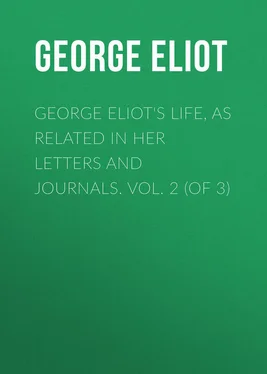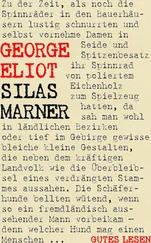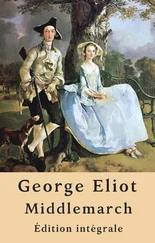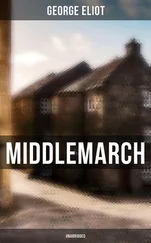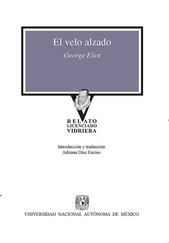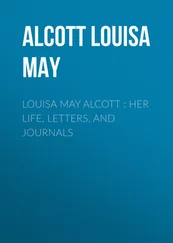George Eliot - George Eliot's Life, as Related in Her Letters and Journals. Vol. 2 (of 3)
Здесь есть возможность читать онлайн «George Eliot - George Eliot's Life, as Related in Her Letters and Journals. Vol. 2 (of 3)» — ознакомительный отрывок электронной книги совершенно бесплатно, а после прочтения отрывка купить полную версию. В некоторых случаях можно слушать аудио, скачать через торрент в формате fb2 и присутствует краткое содержание. Издательство: Иностранный паблик, Жанр: literature_19, foreign_antique, foreign_prose, на английском языке. Описание произведения, (предисловие) а так же отзывы посетителей доступны на портале библиотеки ЛибКат.
- Название:George Eliot's Life, as Related in Her Letters and Journals. Vol. 2 (of 3)
- Автор:
- Издательство:Иностранный паблик
- Жанр:
- Год:неизвестен
- ISBN:нет данных
- Рейтинг книги:3 / 5. Голосов: 1
-
Избранное:Добавить в избранное
- Отзывы:
-
Ваша оценка:
- 60
- 1
- 2
- 3
- 4
- 5
George Eliot's Life, as Related in Her Letters and Journals. Vol. 2 (of 3): краткое содержание, описание и аннотация
Предлагаем к чтению аннотацию, описание, краткое содержание или предисловие (зависит от того, что написал сам автор книги «George Eliot's Life, as Related in Her Letters and Journals. Vol. 2 (of 3)»). Если вы не нашли необходимую информацию о книге — напишите в комментариях, мы постараемся отыскать её.
George Eliot's Life, as Related in Her Letters and Journals. Vol. 2 (of 3) — читать онлайн ознакомительный отрывок
Ниже представлен текст книги, разбитый по страницам. Система сохранения места последней прочитанной страницы, позволяет с удобством читать онлайн бесплатно книгу «George Eliot's Life, as Related in Her Letters and Journals. Vol. 2 (of 3)», без необходимости каждый раз заново искать на чём Вы остановились. Поставьте закладку, и сможете в любой момент перейти на страницу, на которой закончили чтение.
Интервал:
Закладка:
We had no sooner entered the steamboat to cross the Chiem See than it began to rain heavily, and I kept below, only peeping now and then at the mountains and the green islands, with their monasteries. From the opposite bank of the See we had a grand view of the mountains, all dark purple under the clouded sky. Before us was a point where the nearer mountains opened and allowed us a view of their more distant brethren receding in a fainter and fainter blue – a marsh in the foreground, where the wild-ducks were flying. Our drive from this end of the lake to Traunstein was lovely – through fertile, cultivated land, everywhere married to bits of forest. The green meadow or the golden corn sloped upward towards pine woods, or the bushy greenness seemed to run with wild freedom far out into long promontories among the ripening crops. Here and there the country had the aspect of a grand park from the beautiful intermingling of wood and field, without any line of fence.
Then came the red sunset, and it was dark when we entered Traunstein, where we had to pass the night. Among our companions in the day's journey had been a long-faced, cloaked, slow and solemn man, whom George called the author of "Eugene Aram," and I Don Quixote, he was so given to serious remonstrance with the vices he met on the road. We had been constantly deceived in the length of our stages – on the principle, possibly, of keeping up our spirits. The next morning there was the same tenderness shown about the starting of the Stell-wagen : at first it was to start at seven, then at half-past, then when another Wagen came with its cargo of passengers. This was too much for Don Quixote; and when the stout, red-faced Wirth had given him still another answer about the time of starting, he began, in slow and monotonous indignation, "Warum lügen sie so? Sie werden machen dass kein Mensch diesen Weg kommen wird," 4 4 "Why do you tell such lies? The result of it will be that no one will travel this way."
etc. Whereupon the Wirth looked red-faced, stout, and unwashed as before, without any perceptible expression of face supervening.
The next morning the weather looked doubtful, and so we gave up going to the König See for that day, determining to ramble on the Mönchsberg and enjoy the beauties of Salzburg instead. The morning brightened as the sun ascended, and we had a delicious ramble on the Mönchsberg – looking down on the lovely, peaceful plain, below the grand old Untersberg, where the sleeping Kaiser awaits his resurrection in that "good time coming;" watching the white mist floating along the sides of the dark mountains, and wandering under the shadow of the plantation, where the ground was green with luxuriant hawkweed, as at Nymphenburg, near Munich. The outline of the castle and its rock is remarkably fine, and reminded us of Gorey in Jersey. But we had a still finer view of it when we drove out to Aigen. On our way thither we had sight of the Watzmann, the highest mountain in Bavarian Tyrol – emerging from behind the great shoulder of the Untersberg. It was the only mountain within sight that had snow on its summit. Once at Aigen, and descended from our carriage, we had a delicious walk, up and up, along a road of continual steps, by the course of the mountain-stream, which fell in a series of cascades over great heaps of bowlders; then back again, by a round-about way, to our vehicle and home, enjoying the sight of old Watzmann again, and the grand mass of Salzburg Castle on its sloping rock.
We encountered a table-d'hôte acquaintance who had been to Berchtesgaden and the König See, driven through the salt-mine, and had had altogether a perfect expedition on this day, when we had not had the courage to set off. Never mind! we had enjoyed our day.
We thought it wisest the next morning to renounce the König See, and pursue our way to Ischl by the Stell-wagen . We were fortunate enough to secure two places in the coupé , and I enjoyed greatly the quiet outlook, from my comfortable corner, on the changing landscape – green valley and hill and mountain; here and there a picturesque Tyrolese village, and once or twice a fine lake.
The greatest charm of charming Ischl is the crystal Traun, surely the purest of streams. Away again early the next morning in the coupé of the Stell-wagen , through a country more and more beautiful – high, woody mountains sloping steeply down to narrow, fertile, green valleys, the road winding amongst them so as to show a perpetual variety of graceful outlines where the sloping mountains met in the distance before us. As we approached the Gmunden See the masses became grander and more rocky, and the valley opened wider. It was Sunday, and when we left the Stell-wagen we found quite a crowd in Sunday clothes standing round the place of embarkation for the steamboat that was to take us along the lake. Gmunden is another pretty place at the head of the lake, but apart from this one advantage inferior to Ischl. We got on to the slowest of railways here, getting down at the station near the falls of the Traun, where we dined at the pleasant inn, and fed our eyes on the clear river again hurrying over the rocks. Behind the great fall there is a sort of inner chamber, where the water rushes perpetually over a stone altar. At the station, as we waited for the train, it began to rain, and the good-natured looking woman asked us to take shelter in her little station-house – a single room not more than eight feet square, where she lived with her husband and two little girls all the year round. The good couple looked more contented than half the well-lodged people in the world. He used to be a drozchky driver; and after that life of uncertain gains, which had many days quite penniless and therefore dinnerless, he found his present position quite a pleasant lot.
On to Linz, when the train came, gradually losing sight of the Tyrolean mountains and entering the great plain of the Danube. Our voyage the next day in the steamboat was unfortunate: we had incessant rain till we had passed all the finest parts of the banks. But when we had landed, the sun shone out brilliantly, and so our entrance into Vienna, through the long suburb, with perpetual shops and odd names (Prschka, for example, which a German in our omnibus thought not at all remarkable for consonants!) was quite cheerful. We made our way through the city and across the bridge to the Weissen Ross, which was full; so we went to the Drei Rosen, which received us. The sunshine was transient; it began to rain again when we went out to look at St. Stephen's, but the delight of seeing that glorious building could not be marred by a little rain. The tower of this church is worth going to Vienna to see.
The aspect of the city is that of an inferior Paris; the shops have an elegance that one sees nowhere else in Germany; the streets are clean, the houses tall and stately. The next morning we had a view of the town from the Belvedere Terrace; St. Stephen's sending its exquisite tower aloft from among an almost level forest of houses and inconspicuous churches. It is a magnificent collection of pictures at the Belvedere; but we were so unfortunate as only to be able to see them once, the gallery being shut up on the Wednesday; and so, many pictures have faded from my memory, even of those which I had time to distinguish. Titian's Danae was one that delighted us; besides this I remember Giorgione's Lucrezia Borgia, with the cruel, cruel eyes; the remarkable head of Christ; a proud Italian face in a red garment, I think by Correggio; and two heads by Denner, the most wonderful of all his wonderful heads that I have seen. There is an Ecce Homo by Titian which is thought highly of, and is splendid in composition and color, but the Christ is abject, the Pontius Pilate vulgar: amazing that they could have been painted by the same man who conceived and executed the Christo della Moneta! There are huge Veroneses, too, splendid and interesting.
Читать дальшеИнтервал:
Закладка:
Похожие книги на «George Eliot's Life, as Related in Her Letters and Journals. Vol. 2 (of 3)»
Представляем Вашему вниманию похожие книги на «George Eliot's Life, as Related in Her Letters and Journals. Vol. 2 (of 3)» списком для выбора. Мы отобрали схожую по названию и смыслу литературу в надежде предоставить читателям больше вариантов отыскать новые, интересные, ещё непрочитанные произведения.
Обсуждение, отзывы о книге «George Eliot's Life, as Related in Her Letters and Journals. Vol. 2 (of 3)» и просто собственные мнения читателей. Оставьте ваши комментарии, напишите, что Вы думаете о произведении, его смысле или главных героях. Укажите что конкретно понравилось, а что нет, и почему Вы так считаете.
